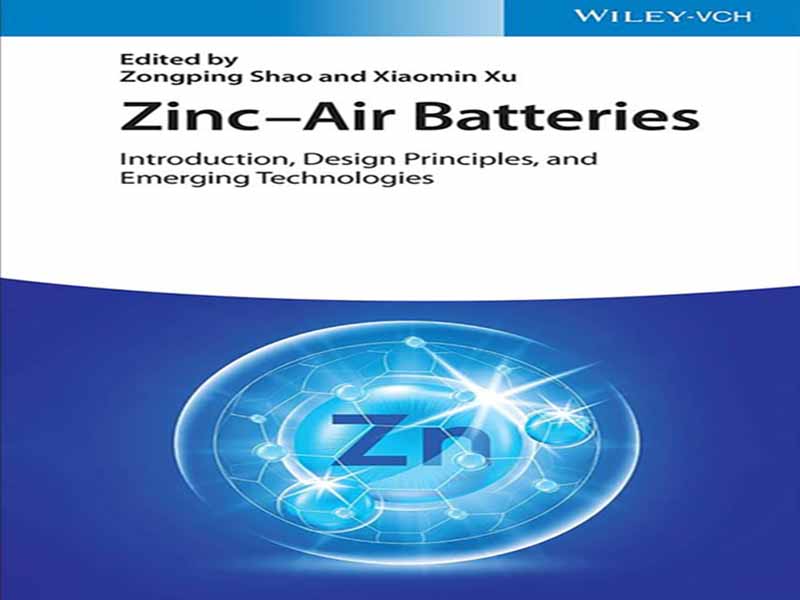- عنوان کتاب: Zinc–Air Batteries / Introduction, Design Principles, and Emerging Technologies
- نویسنده: Zongping Shao
- حوزه: باتری
- سال انتشار: 2022
- تعداد صفحه: 377
- زبان اصلی: انگلیسی
- نوع فایل: pdf
- حجم فایل: 11.4 مگابایت
فناوریهای ذخیرهسازی و تبدیل انرژی الکتروشیمیایی، که میتوانند شکاف بین عرضه و تقاضای برق را کاهش دهند، همچنان نقش مهمی در تعقیب بشریت برای آینده انرژی سبز و پایدار خواهند داشت. یکی از نمونههای خارقالعاده فنآوریهای باتری است که در میان آنها باتریهای لیتیوم یونی شناختهشدهترین هستند و دستگاههای الکترونیکی قابل حمل را متحول کردهاند و از زمان معرفی آنها در دهه 1990 بر بازار مصرفکننده تسلط داشتهاند. متأسفانه، حداکثر چگالی انرژی باتریهای لیتیوم یون موجود هنوز برای پاسخگویی به تقاضاهای بازارهای نوظهور مانند خودروهای الکتریکی کافی نیست. اخیراً، باتریهای فلزی هوا به عنوان یک گزینه جایگزین مورد توجه زیادی قرار گرفتهاند، زیرا چگالی انرژی بسیار بالایی را نشان میدهند که بسیار بیشتر از بهترین باتریهای لیتیوم یونی است. به طور خاص، باتریهای روی-هوا (ZABs) توجه فزایندهای را به خود جلب کردهاند، که در مقایسه با باتریهای لیتیوم یونی، دارای مزایای اضافی مانند هزینه کمتر، ایمنی بالاتر و سازگاری با محیط زیست بهتر هستند. در حالی که دهههای گذشته شاهد تلاشهای تحقیقاتی قابلتوجهی در توسعه ZABهای پیشرفته با عملکرد بهبود یافته از نظر بهرهوری انرژی، کاهش هزینه و دوام بودهاند، چالشهایی که مانع استقرار در مقیاس وسیعتر فناوری ZAB میشوند، همچنان وجود دارد. با توجه به این موضوع، یک کتاب مشخص در زمینه مبانی و کاربردهای ZAB ها، که در حال حاضر دیده نمی شود، باید برای تسهیل تحقیق و توسعه فناوری ZAB در بلندمدت بسیار مفید باشد. این کتاب مقدمه ای جامع و به روز برای ZAB ها ارائه می دهد که تحولات گذشته، حال و آینده را پوشش می دهد و تحقیقات بنیادی و کاربردی را در بر می گیرد. به طور خاص، اصول طراحی در مورد اجزای کلیدی ZAB ها از کاتد هوا گرفته تا آند روی و الکترولیت مورد تاکید قرار گرفته است. تمرکز ویژه ای به پیشرفت های اخیر در کاتالیزورهای کاتدی به دست آمده توسط مواد پیشرفته، فرآیندهای مهندسی و فناوری ها داده شده است. علاوه بر این، تحولات صنعتی ZAB ها مرور شده و طراحی جدید در حال ظهور ZAB ها نیز معرفی شده است. ما امیدواریم که این کتاب بتواند به عنوان یک ابزار مفید برای دانشجویان، محققان و مربیان شاغل در فنآوریهای باتری، علم مواد و الکتروشیمی، و برای نمایندگان صنعت و دولت برای تصمیمگیری مرتبط با انرژی و حملونقل باشد. ما همچنین امیدواریم که این کتاب علاقه عمومی بیشتری را برانگیزد و توسعه بیشتر در فنآوریهای ذخیره و تبدیل انرژی الکتروشیمیایی را ارتقا دهد.
Electrochemical energy storage and conversion technologies, which can mitigate the gaps between supply and demand of electricity, will continue to play a critical role in humanity’s pursuit of a green and sustainable energy future. One extraordinary example is battery technologies, among which Li–ion batteries are the best known and have transformed portable electronic devices and dominated the consumer market ever since their introduction in the 1990s. Regrettably, the maximum energy density of the currently available Li–ion batteries is still not sufficient to meet the demands of emerging markets, such as electric vehicles. Very recently, metal–air batteries are receiving a great deal of interest as an alternative option because they show extremely high energy densities that far exceed the best that can be offered by Li–ion batteries. In particular, zinc–air batteries (ZABs) have attracted growing attention, which, compared with Li–ion batteries, feature additional advantages such as lower cost, higher safety, and better environmental friendliness. While the past decades have witnessed significant research efforts in developing advanced ZABs with improved performance in terms of energy efficiency, cost reduction, and durability, challenges hindering the wider-scale deployment of the ZAB technology still remain. With respect to this, a specified book contribution on the fundamentals and applications of ZABs, which is currently not seen, should be highly useful to facilitate the research and development of the ZAB technology in the long run. This book provides a comprehensive and up-to-date introduction to ZABs, covering past, present, and future developments and spanning both fundamental and applied research. In particular, design principles regarding the key components of ZABs ranging from air cathode to zinc anode and to electrolyte are emphasized. A special focus is given to the recent advances in the cathode catalysts achieved by cutting-edge materials, engineering processes, and technologies. Furthermore, industrial developments of ZABs are overviewed and emerging new design of ZABs is also introduced. We hope that this book could serve as a handy tool for students, researchers, and instructors working in battery technologies, materials science, and electrochemistry, and for industry and government representatives for decision making associated with energy and transportation. We also hope that this book will stimulate wider general interest and promote further development in electrochemical energy storage and conversion technologies.
این کتاب را میتوانید از لینک زیر بصورت رایگان دانلود کنید:
Download: Zinc–Air Batteries / Introduction, Design Principles, and Emerging Technologies



































نظرات کاربران